- Home
- Jessa Archer
Palatino for the Painter Page 2
Palatino for the Painter Read online
Page 2
The only thing I’d really missed from my life in Nashville was my daughter, and recent events seemed to have solved that problem. Cassie had decided not to return to Nashville after our misadventure a few months ago, when Edith Morton’s killer held us at gunpoint. I was glad to have Cassie home, but the decision worried me. She’d had a life in Nashville, and a job she enjoyed. Was she staying because she wanted to be here, or because that experience had scarred her. She seemed okay to me, but what was there in a tiny mountain town for a girl in her early twenties? How long would she enjoy weekend outings like this one, accompanying her mom and her mom’s best friend to an estate sale? When I was her age, I would have been bored silly. There was no force on the planet that could have convinced a twenty-two-year-old Ruth Townsend to live in Thistlewood, Tennessee.
“Do you know where Cassie went?” I asked Wren.
“Still upstairs, I think.” She leaned toward me and whispered, “Cross your fingers that she hasn’t found another diary. I don’t have a key to this place, so sneaking in to return it would be much harder.”
“Remind me to check her purse before we leave,” I said. Cassie’s curiosity was a large reason we’d wound up in hot water a few months back, but it was also a major factor in me solving the case. Not something I’d want to risk again, however.
Wren glanced over at Kenneth McBride, standing at the edge of the room with a dazed expression on his face. Human interaction didn’t seem to be his strongest suit. Or maybe he just didn’t like crowds.
“Oh, Ruth,” she whispered. “Why did we come here? This is actually sad.”
“I know. Do you want to leave?”
“Yes. But first I’m going to buy some of these books. I’ll give them a good home. The ones I don’t have room for, I’ll donate to the library. How much do you think I should offer?”
“I don’t know. Maybe you should ask him?”
Wren squared her shoulders as if she were preparing for battle and walked across the living room. I hung back, trying to stay out of everyone’s way, and watched as she tapped him lightly on the shoulder. Her lips were moving, but I couldn’t hear what she was saying over the ambient noise—a baby crying somewhere, laughter upstairs.
Someone stepped up behind me. I turned, thinking it was Cassie, but instead found Dean Jacobs smiling at me. As usual, he was looking very handsome, something that’s hard to pull off in a mail carrier’s uniform.
“Good morning, Ruth.”
“Dean! It’s so good to see you. What brings you here?”
He looked around doubtfully. “I’m kind of wondering that myself. Not like I need anything else cluttering up my house. I should have a sale of my own, actually.”
“You should team up with Wren,” I said and looked down at my watch. “It’s early. Mail already delivered?”
Dean laughed but looked a little guilty. “Nah. Just taking a quick break. Saw the sign when I was coming down the sidewalk and noticed your Jeep out by the curb.” He glanced down at the floor. “I was sorry to hear about what happened to you and Cassie. Can’t say I ever really liked the two of them, but I didn’t think they were murderers.”
“Greed can be a powerful motivator,” I said. “I’m just glad that it’s over.”
“Yeah. Me, too. Is…um…Cassie staying in town for a while?”
I nodded. “Yeah. I think she’s at sort of a crossroads. Trying to figure out what she wants to do next.”
“Oh. Is she…here?” His face was turning red, and I laughed. I couldn’t help it.
“You should come up and see us one night,” I told him. “If not for you mentioning that Edith’s door was locked the day she died, I might not have figured things out. The least I can do is cook you dinner.”
He looked surprised. “Really?”
“Sure. Why not?”
“Do you think Cassie would like that?”
“I don’t know,” I answered truthfully. “I would, though.”
“Then I’d love to. Just let me know when.”
Cassie chose that moment to appear, and Dean flushed again.
“Good morning, Cassie.”
“Oh, hey, Dean,” she said, and then turned toward me. I wanted to laugh because she was so completely oblivious to the torture she was inflicting on the poor boy.
“I was just telling Dean he should come over for dinner sometime. What do you think?”
“That’s a great idea. It’s almost always just me and Mom. Sometimes Ed or Wren. I love them dearly but…it would be sooo nice to have someone closer to my own age around for a change.” She turned her attention back to me. “Mom, I have to show you something. Hurry.”
“Okay.”
Cassie bounded off toward the kitchen and through a door that led to a garage. Dean and I followed. Lucy McBride’s car had already been sold, and the smooth concrete floor was spotless. Plastic totes were stacked neatly in one corner, most labeled in the large, loopy handwriting I remembered from the blackboard as we discussed Beowulf and Hamlet. Decorations, apparently—Halloween, Christmas, July 4th. I felt a little pang of sadness that these would probably never see the light of day again. No one was going to buy someone else’s memories like that. I wondered if Kenneth would throw them out or pack them up to take back to California.
The one thing that seemed out of place in the almost obsessively tidy garage was a large cardboard box propped up against the wall next to the garage door. It looked like the kind of container that a mirror might come in—tall and wide but not very deep. Scrawled across the front in blocky letters was Ruth Townsend—Thistlewood Star.
“What on earth?” I said.
“Looks like she left something for you,” Cassie said. “Come see. I have to confess that I already peeked.”
I shook my head, laughing. “Now, why doesn’t that surprise me?”
She pulled open the flap covering the end of the box. I reached in slowly to touch the frames stacked upright inside the package.
“Canvases?”
“They’re paintings, Mom. Pretty good, too, based on the ones I saw.”
She reached in and gently pulled the first one out.
It wasn’t simply good. It was breathtaking. A large, vibrant tree took up most of the canvas. Some kind of weeping willow, maybe, but the colors were surreal. The trunk and branches were fairly normal, painted in a muddy, weathered brown acrylic. The leaves, however, were various shades of teal—some neon bright, some dark, and others almost transparent with the blue-green revealing the ugly brown below. I’m here, the brown seemed to say. No matter how pretty the surface, I’m always here underneath.
“It’s beautiful,” Dean said from behind my shoulder. “A little eerie, though.”
I nodded. He had summed it up perfectly.
The world needs more beauty. That’s what makes life worth living. Maybe this was her way of reminding me about that conversation so many years ago.
“They’re all beautiful,” Cassie said. “But why are they out here in the garage—and with your name on the box? Do you think she wanted you to have them?”
“I don’t know,” I said as I slid Lucy’s painting back into the box. “Maybe I should go ask Kenneth.”
“They’d look perfect in your office at the Star,” Cassie said. “The place needs some color.”
She was right about that. I’d been thinking for months that the office looked kind of dreary. And now that I’d taken over the newspaper, it somehow seemed right to have Lucy McBride’s artwork hanging in Mr. Dealey’s old office to represent the two people—well, aside from my parents—who did the most to set me on my path as a journalist.
“I think that’s a good idea,” I told Cassie as I rummaged in my purse to see if I’d brought my checkbook. I had a little cash on me but not much, since I really hadn’t expected to buy anything. For the most part, I’d come because Wren mentioned it, and I thought it would be a good opportunity to get Cassie out of the house. And looking at her just then, showing Dean the
other paintings, I thought maybe that was a very good idea.
I turned to see Wren coming down the steps into the garage. “There you are! I was beginning to think y’all left me here.”
“Nope. Did you get the book situation worked out?”
Wren nodded. “Twenty dollars. I feel like I’m stealing them.”
“If any of those are first editions, you sort of are. And knowing Ms. McBride, that wouldn’t surprise me at all.”
“I know, and I tried to tell Kenneth that, but he said he’s just glad to know they’ll have a good home. He’s out of boxes, though, so I’m going to come back later, after all of this traffic clears, and load them into the trunk. If y’all are ready to go, I’m starved. Maybe lunch at the diner? And Dean, you’re more than welcome to join us.”
“Wish I could,” he said, “but break’s over. I need to get back on my route.”
“Wren, come here,” Cassie said. “Ms. McBride was quite the artist. And look.” She tapped my name on the box.
“I’m going back inside to talk to Kenneth,” I told her. “See what he’ll let them go for. My office needs a little color.”
“Huh,” Wren said. Her voice sounded a little strained. “I didn’t know she painted. He’ll probably give them to you for free, though. I had to practically shove my twenty into his hand. And if she put your name on them…”
That was true, but I wondered whether the paintings were really something her son was willing to let go. These were things his mom created with her own hands. Originals. I was pretty sure that a piece of her soul had gone into these, and that thought caused my eyes to water.
Just then, my new iPhone—a late birthday gift to myself, and unlike my old one, capable of keeping a charge for more than an hour—chirped to life in my front pocket. It was Ed Shelton, who I guess I can call my boyfriend now, although that term sounds ridiculous for a sixty-year-old man. I motioned for the others to give me a second and stepped off to the side.
“Hey, Ed. What’s up?”
I listened quietly for a moment and then told him I’d be right there. Even though the garage was stifling, I shivered.
“Mom?” Cassie said. “What’s wrong?”
“Lunch will have to wait. That was Ed. Someone just found a car in the river. And there’s a body inside.”
✰ Chapter Two ✰
Small towns are strange places, especially when it comes to death. When you live in a larger town and you read in the paper or hear on the news or even through the grapevine that a body has been found, you might idly wonder who it is. You don’t, however, immediately assume that it’s someone you know. In a town as small as Thistlewood, however, the odds are pretty high that you did know the person. There’s an off chance that it could be a tourist, which would be awful in its own right, but your heart can’t help but shift into overdrive at the news.
That’s what I’d felt when Ed told me, and I knew that he was feeling the same. The odds that he’d known the person inside that car were even higher. Ed Shelton had served as sheriff of Woodward County for well over a decade. You don’t win reelection three times without shaking a whole lot of hands.
I set off for the river with Wren riding shotgun. We hadn’t exactly discussed her tagging along. It just sort of happened. Wren has this cool and calming way about her that I wouldn’t trade for anything. It’s what makes her so good at her job, and it also makes her an excellent person to have at your side during a crisis.
Cassie had opted to stay behind. She wanted no part in venturing down to the river with me when there was a body involved. I’d left her with my checkbook so she could negotiate with Kenneth McBride about the paintings we’d found in the garage.
“According to Ed, the car was spotted just this side of Jolly’s Marina,” I told Wren. “We need to keep an eye out for a fishing trail on the left. Should be the second one after the bridge, just past a large rock.”
Okay, that’s one other thing that I kind of missed about Nashville. Roads have names there, and they actually show up on the GPS. Here, except for major roads and those within the city limits, you were pretty much on your own, and instructions in Thistlewood were often maddening. First left past the big red barn. Then take the second right after Joe Wheeler’s house. If you land in the river, you’ve gone too far.
That didn’t seem very amusing now, with a car in the river.
Traffic was nowhere near the peak that we’d hit during the summer, but it was Saturday, so there were a number of cars headed to the river, loaded down with coolers and inner tubes. Most were semi-local, from neighboring cities and towns, just out for the afternoon. They had no idea yet that the river would be pretty much shut down for two miles or so downstream from the spot where the car was found.
“Do they have any idea how long the car has been there?” Wren asked.
“No. I don’t think he knew yet. He told me they were just about to pull the vehicle out.” There was a little nervous quaver to her voice that made me think the question was more than idle curiosity, so I added, “Why do you ask?”
“It’s just that I hate processing drowning victims,” Wren said. “Not much I can do with a body that’s been submerged for any length of time.”
“What are the effects on the body?” I asked, kind of dreading her answer but still wanting to know.
“Depends on how long the body has been in the water.” She went on to paint a fairly vivid picture, which was more detailed than I’d have anticipated.
“You’ve had to deal with more than a few, I guess?”
She shrugged. “When you live near a river, accidents happen.”
I turned onto the road Ed had mentioned, taking the ruts and bumps as carefully as I could. It wasn’t much of a road, really. More of a wide path of beaten grass and dried mud beneath the tires.
“Thanks for coming with me,” I said to Wren as we bumped along toward the river. “You’re a good friend.”
She laughed. “Hey, I broke into a house with you. Compared to that, this is nothing. And I didn’t have anything else on tap for today.”
We passed a large metal sign riddled with bullet holes. No Trespassing. Judging from the tire tracks in the mud and the empty beer cans sticking up from the grass like bright metallic Easter eggs, it seemed that few people heeded the warning. I slowed down and maneuvered a particularly deep puddle, and as we rounded the small curve just beyond, the trees broke away, giving us our first clear view of the river.
The police had set up an amateur-looking barricade—yellow caution tape stretched between a dirty sawhorse and a tree at the edge of the woods. Two Woodward County police cruisers were parked on the left side, one marked Sheriff.
“Oh, look,” I said. “It’s our very favorite person.” Even though I’d known Steve Blevins would be there, I felt a twang of disappointment. Any day that I could completely and totally avoid that man was a good day in my book.
I cheered up, however, when I caught sight of Ed leaning against the hood of his truck.
Wren grinned at me. “I see you looking out the corner of your eye at Ed, all cool over there by his Silverado. Can’t say I ever imagined you falling for the cowboy type, but at least you picked a good one.”
“Cowboy type? Ed?”
“All he needs is a hat and boots.”
She did kind of have a point now that I thought about it. I opened the back door and began digging around in the junk on the floorboard, looking for the zoom lens for my camera. I was glad I’d left the camera and various paraphernalia in the Jeep, even though it’s a ragtop and Ed swears that one day someone is going to rob me blind. He’s probably right, and when the tourists pour into Thistlewood over the summer, I’ll need to be more careful. But some mornings, I’d forget my head if it wasn’t firmly tacked onto my shoulders, so leaving the camera in the Jeep was the only way I could be sure I’d have it when I needed it. And yes, I could use my phone camera in a pinch, but I never really feel like I’m on the job unless I’m carryin
g my Nikon.
Wren gave the river a wary look. “I’ve got a bad feeling about this. Which is stupid. I see bodies all the time.”
It was a little unnerving to see Wren rattled, especially when I was feeling nervous, too. I think it was partly due to Wren’s description of drowning victims. We really didn’t have any idea what we were going to find.
“Makes sense,” I said as I pulled the camera strap over my head. “You’re just used to them bringing the bodies to you. The accident or crime scene has a different vibe. You can wait here if you want…”
“No. I’m fine.”
Ed smiled as we approached. “Well, you made it here in record time.”
I nodded. “Camera was in the backseat, against the advice of this ex-sheriff I know. So I didn’t have to go back to the office.”
“Right.” He waved at Wren. “Brought your partner in crime, I see.”
“Never leaves home without me,” Wren said. “How’s it going?”
“They’re just about to bring the car up.” He nodded toward Blevins and his deputy, who were standing at the river’s edge talking to the tow truck driver. The truck was backed right up to the bank, and the thick chain snaked from the rear of the truck, disappearing into the water.
Blevins hadn’t seen me yet, which was good. I raised my camera and took a few shots. The motion caught the eye of the deputy, Billy Thorpe, and he gave me a little smile, which I might have missed if I hadn’t had the zoom on. Thorpe had been one of Ed’s deputies back when he was the sheriff, and like most of the department, he preferred the old boss to Blevins. Ed had been forced to retire after he was the victim of a hit-and-run driver—a driver who was quite possibly Blevins’s then-teenaged son—seven years ago during a routine traffic stop on New Year’s Eve. The accident shattered his hip and left him with a decisive limp. He writes mysteries now. Good ones, too. Billy would probably lose his job if the man ever found out how much he shares with Ed. I get the sense that Billy might be the one who does the actual police work—the non-political side of the job that Blevins doesn’t enjoy—so maybe that’s his job security.

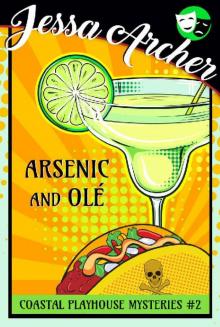 Arsenic and Ole
Arsenic and Ole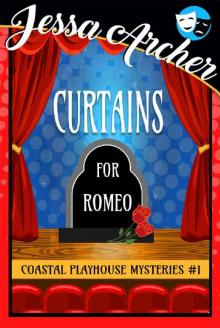 Curtains for Romeo
Curtains for Romeo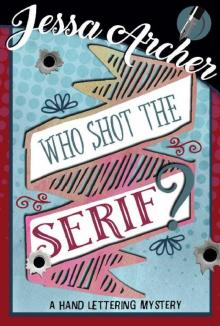 Who Shot the Serif
Who Shot the Serif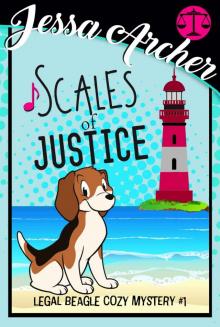 Scales of Justice
Scales of Justice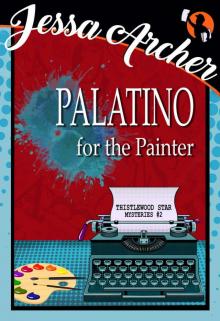 Palatino for the Painter
Palatino for the Painter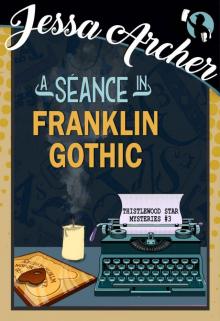 A Séance in Franklin Gothic
A Séance in Franklin Gothic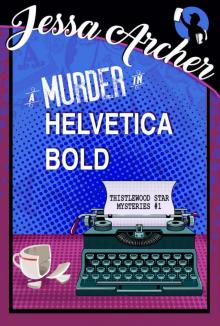 A Murder in Helvetica Bold
A Murder in Helvetica Bold